Lea Wait's Blog, page 119
January 31, 2021
My 250th Blog at Maine Crime Writers
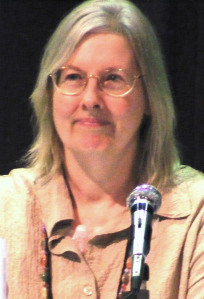
the photo I used ten years ago when the blog began
Kaitlyn Dunnett/Kathy Lynn Emerson here. As I was trying to think what to write about this time around, and contemplating the possibility of collecting some of my previous blogs into a book, it occurred to me to count just how many I’ve written since Maine Crime Writers launched nearly ten years ago. The serendipitous total was 249, making this lucky number 250.
Consider this a retrospective. No, I won’t go through all 249 topics again, or share the entire treasure trove of photos used in early blogs I’d forgotten I had on my computer—the ones that vanished from our blog archive when we revamped the site—but I will share that a look at the titles alone was enough to convince me that it will be pretty simple to organize them into topics. My very first blog’s title—”I Kill People for a Living” may very well work as the title for the entire collection.
You may be wondering if there’s a market for collections of blogs. I think there is, especially if I call them essays rather than posts. They actually were written as essays, at least in my mind. That format has always been a comfortable fit for me. Once upon a time, I taught college freshman how to write essays in English 101, otherwise known as Freshman Composition.
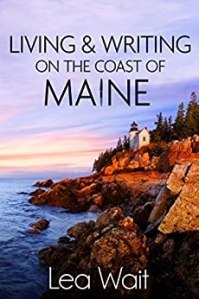 In past centuries, essay collections were popular reading. The genre is more of a niche market these days, but it still exists, even if the word “essay” isn’t always used. Essays are called stories in Tim Cotton’s The Detective in the Dooryard. Dave Barry’s books are collections of his humorous newspaper columns. There’s even a precedent for collecting Maine Crime Writers’ blogs into a book—Lea Wait’s Living and Writing on the Coast of Maine.
In past centuries, essay collections were popular reading. The genre is more of a niche market these days, but it still exists, even if the word “essay” isn’t always used. Essays are called stories in Tim Cotton’s The Detective in the Dooryard. Dave Barry’s books are collections of his humorous newspaper columns. There’s even a precedent for collecting Maine Crime Writers’ blogs into a book—Lea Wait’s Living and Writing on the Coast of Maine.
So, dear readers, here are a couple of questions for you. Would you read such a collection (notice I say read, not buy) if it were available as an e-book and trade paperback? And what do you think of the following as sections of the book?
On Cozy Mysteries
On Historical Mysteries
On the Book (Books) of the Heart
On Being Inspired by People
On Being Inspired by Places
On Being Inspired by Fiction
On Miscellaneous Tips for Writers
On Climbing the Family Tree for Fun and Profit
On Mining Life Experience for use in Writing Fiction
On Life in Rural Maine in the 21st Century
On Cats
On Oddities, Past and Present
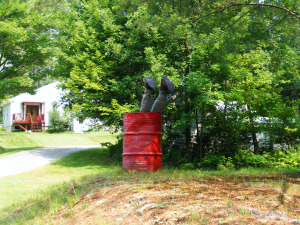
one of the oddities I wrote about in an early post
I look forward to hearing what you think. And one person who comments below will be chosen to receive his or her choice of one of my published books—any one I still have available in print copies.
Thanks in advance for your input.

Kathy Lynn Emerson/Kaitlyn Dunnett has had sixty-three books traditionally published and has self published several children’s books. She won the Agatha Award and was an Anthony and Macavity finalist for best mystery nonfiction of 2008 for How to Write Killer Historical Mysteries and was an Agatha Award finalist in 2015 in the best mystery short story category. She was the Malice Domestic Guest of Honor in 2014. Currently she writes the contemporary “Deadly Edits” series (A Fatal Fiction) as Kaitlyn. As Kathy, her most recent book is a standalone historical mystery, The Finder of Lost Things. She maintains websites at www.KaitlynDunnett.com and www.KathyLynnEmerson.com. A third, at A Who’s Who of Tudor Women, is the gateway to over 2300 mini-biographies of sixteenth-century Englishwomen.
January 29, 2021
Weekend Update: January 30-31, 2021
 Next week at Maine Crime Writers there will be posts by Kaitlyn Dunnett/Kathy Lynn Emerson (Monday), Kate Flora (Tuesday), Brenda Buchanan (Thursday) and Vaughn Hardacker (Friday).
Next week at Maine Crime Writers there will be posts by Kaitlyn Dunnett/Kathy Lynn Emerson (Monday), Kate Flora (Tuesday), Brenda Buchanan (Thursday) and Vaughn Hardacker (Friday).
In the news department, here’s what’s happening with some of us who blog regularly at Maine Crime Writers:
We thought you would enjoy this review of Charlotte’s Web:
On E.B. White’s “Charlotte’s Web”Eudora Welty’s review of this timeless tale is a sheer delight, starting from its headline (“Life in the Barn Was Very Good”) and its first sentence (“E.B. White has written his book for children, which is nice for us older ones as it calls for big type”). Unlike contemporary reviews that get future classics “wrong,” Welty — who worked briefly as an editor at the Book Review during World War II — saw this accomplishment clear in the moment. “What the book is about is friendship on earth, affection and protection, adventure and miracle, life and death, trust and treachery, pleasure and pain, and the passing of time,” she wrote. “As a piece of work it is just about perfect, and just about magical in the way it is done.”
Also a reminder that from time to time we offer give-aways to our readers, which will be announced here. We encourage you to keep your cameras with you, as there will definitely be another “Where Would You Put The Body?” contest in the spring.
April, and National Library Week, will be upon us before we know it, and we wonder if our readers have suggestions about how a group of crime writers should celebrate?
An invitation to readers of this blog: Do you have news relating to Maine, Crime, or Writing? We’d love to hear from you. Just comment below to share.
And a reminder: If your library, school, or organization is looking for a speaker, we are often available to talk about the writing process, research, where we get our ideas, and other mysteries of the business. We also do programs on Zoom. Contact Kate Flora
January 28, 2021
“All night, in happiness, she hunts and flies …”
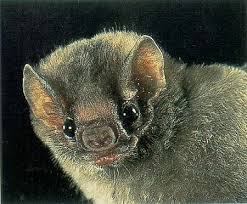
Sandra Neily here:
I know we’ve got lots more winter, but recently I read the opening of my novel Deadly Turn to a book group (the story opens with a bat) and realized I was thinking ahead to a spring without bats. I miss the great clouds of them winging over the cove at dusk, zig zagging over the water after smaller clouds of mosquitos. So much life in the sky just when the rest of the world is settling down for night.
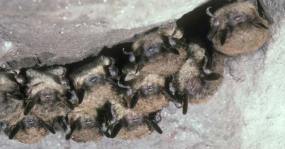
Diseased bats, note the white fungus.
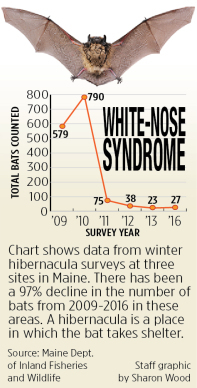 Maine’s bat population has declined by 97%. There’s a fungus killing thousands and thousands. We know about the fungus killing them.
Maine’s bat population has declined by 97%. There’s a fungus killing thousands and thousands. We know about the fungus killing them.
“We don’t really know much about a newer source of mortality: wind power installations. How are bats affected by wind turbines? Dead bats are found beneath wind turbines all over the world. It’s estimated that tens to hundreds of thousands die at wind turbines each year in North America alone.
Unfortunately, it’s not yet clear why this is happening. It’s possible that wind turbines interfere with seasonal migration and mating patterns in some species of bats. More than three quarters of the bat fatalities at wind turbines are from species known as “tree bats,” which tend to migrate long distances and roost in trees. These bats migrate and mate primarily during late summer and early autumn, which is also when the vast majority of bat fatalities at wind turbines occur. It’s also possible that bats mistake slow or stopped turbine blades for trees.”
In other words, we bulldozed the roads and erected the turbines before there was a decent research and scientific process to understand wildlife mortality. 
My novel Deadly Turn opens with narrator Patton holding a dying bat and then her boss explains what killed it.
Alone on Eagle Ridge, I clutched a dying bat. Against all rabies advice, I pulled off my gloves to find the animal’s heart and my bare thumb stroked a tiny throb. At the last limp spasm, the bat’s eyes filmed over. My eyes blurred, too. Then I bent and smelled her, hoping she was female and we had something in common.
I closed my eyes and saw her. Almost as dark as the night around her, she turned toward a flying moth, chirping as she closed in on her meal. Cupping her tail into a shovel shape, she scooped the moth from the air, bent herself over, and shoved it up into her mouth. Before she could land and eat, she bent double again and fell, panting for breath, feebly beating her wings against bushes that held her.
… Anita dropped her pack and felt around her pockets. I thought I could avoid another biology lecture by stepping up. “I don’t need a complete replay,” I said. “I get the echo thing—bats send sounds that echo off what they hunt so they can find dinner—but this makes no sense.”
“Echolocation’s not involved here.” Frowning at my naked hands, she pulled gloves from her pocket and snapped them over her fingers. Then she lifted a scalpel from a case tucked into her shirt pocket. The cut bat slurped open like over-ripe fruit, its innards a bright red blood bomb.
“At two hundred miles an hour, rotating blades change air pressure,” Anita said. “The dropping pressure explodes blood vessels next to the bat’s lungs and the lungs fill with blood. Bats drown in their own blood. Kind of like scuba divers getting the bends when they don’t take time to equalize pressure as they surface. They say the pain is something else.” She pressed the bat’s chest back together, slipped it into a bag at her waist, sheathed her scalpel, and walked downhill.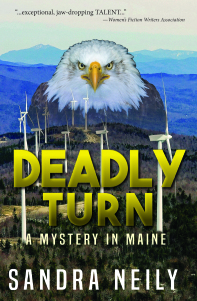
More Info:
Read All about bats
“Bat Conservation: Helping Maine’s Bat Population in the Face of White Nose Disease and Other Threats.” Listen to a “Maine Calling” program.
Bat Conservation International provides these helpful instructions if there’s a bat in your house.
Deterrence research and strategies: From Concept to Commercialization – Bat Deterrent for Wind Energy Goes Global | Department of Energy “Since 2000, installed wind energy capacity in the United States has increased from slightly more than 2.5 gigawatts (GW) to more than 100 GW. As wind energy installation increases, so does the potential impact on various wildlife species, including bats.”
Bat Conservation International “Bat fatalities from collisions with wind energy turbines are now one of the leading causes of observed mortality of bats globally. Hundreds of thousands of bats are killed each year by wind turbines in the United States and Canada. Fatality rates from wind turbines are high enough to cause rapid declines in populations and increase risk of extinction for migratory species, such as the hoary bat” … BCI helps test innovative methods, such as smart curtailment systems and acoustic deterrents, to mitigate bat fatalities at wind farms.
Building bat houses Build a Bat House (nwf.org)
…. and Poetry
Bats
A bat is born
Naked and blind and pale.
His mother makes a pocket of her tail
And catches him. He clings to her long fur
By his thumbs and toes and teeth.
And then the mother dances through the night
Doubling and looping, soaring, somersaulting—
Her baby hangs on underneath.
All night, in happiness, she hunts and flies.
Her high sharp cries
Like shining needlepoints of sound
Go out into the night and, echoing back,
Tell her what they have touched.
She hears how far it is, how big it is,
Which way it’s going:
She lives by hearing.
The mother eats the moths and gnats she catches
In full flight; in full flight
The mother drinks the water of the pond
She skims across. Her baby hangs on tight.
Her baby drinks the milk she makes him
In moonlight or starlight, in mid-air.
Their single shadow, printed on the moon
Or fluttering across the stars,
Whirls on all night; at daybreak
The tired mother flaps home to her rafter.
The others all are there.
They hang themselves up by their toes,
They wrap themselves in their brown wings.
Bunched upside-down, they sleep in air.
Their sharp ears, their sharp teeth, their quick sharp faces
Are dull and slow and mild.
All the bright day, as the mother sleeps,
She folds her wings about her sleeping child.
Sandy’s novel “Deadly Trespass, A Mystery in Maine,” was a finalist in the Maine Literary Awards, a recipient of a Mystery Writers of America national award and a national finalist in the Women’s Fiction Writers Association “Rising Star” contest.. Her second Mystery in Maine novel, “Deadly Turn” is now in Sherman’s Books and on Amazon in Kindle and paperback. She lives in the Maine woods and says she’d rather be “fly fishing, skiing remote trails, paddling near loons, or just generally out there.” Find more info on her website .
January 27, 2021
Housekeeping in the Time of Covid

While poking around online the other day, I ran across an article entitled “48 Things That Will Help Lazy People Be Way Cleaner”—a poorly titled but interesting compendium of products designed to make cleaning the family manse more efficient, less time consuming and “way more fun.” Or so the author claimed. I’ll spare you said list. More to the point is the energy required to get it all done. I figure there’s no more housework to do mid-pandemic than in times past, and considering that many of us are home so much right now, we should have no problem fitting it all in, right? Not so fast.
Prior to Covid, I was a cooking fiend, a cleaning whirlwind—splitting my time and energy between switching out massive loads of laundry, mopping floors (hats off to the inventors of Swiffer and its various iterations) and the obsessive preparation of the rafts of meals needed to get us through the week. These days I might vacuum a room or two, run a load of laundry if the mood grabs, before face-planting on the couch for a much needed mid-morning nap.
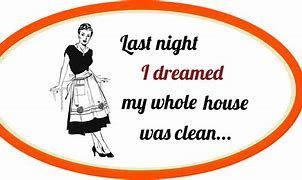
So much for all my former get up and go, those once legendary organizational skills. Ironing, something I’ve long enjoyed for its calming, repetitive motion and comforting smells evocative of my grandmother’s ancient electric mangle, is long in my rear-view. And dusting? Fuggetaboutit. Dust bunnies are the least of my problems just now (more on that in a few).
And then there are the plants, of which I have many. I’m here to tell you that the dead and desiccated are just as attractive in their own way as those still absorbing sunlight and sucking up water. They’re certainly easier to take care of. In fact if you look at them at just the right angle, they take on a stark, sculptural beauty—a kind of brittle statuary, if you will.
A good friend who happens to be a therapist suggests I might be depressed. You think? Could it be that with all that’s currently going on in the politico-econo-pandemic vein, avoiding the usual cleaning routine is my only acceptable method of rebellion? A cry for a return to normalcy, perhaps? My all-too-cheerful, semi-retired husband who arrives home each afternoon and heads to the barn eager to attack his long list of next season’s boat projects (such industry!) suggests that bringing someone in to “help” with the heavy lifting might just be the ticket, but frankly my house isn’t all that large and there’s really not much of anything to “lift.” I suspect he’s humoring me in hopes I’ll snap out of it and the piles of clean tighty-whities he’s so used to seeing in his dresser drawer will return in more dependable numbers.
In closing, I return to the subject of dusting and a little bon mot pulled yet again from the Internet…

You come from dust.
You’ll return to dust.
That’s why I don’t dust.
After all, it could be someone I know!

Darcy Scott (Winner, 2019 National Indie Excellence Award; Best Mystery, 2013 Indie Book Awards; Silver Award, 2013 Readers Favorite Book Awards; Bronze Prize, 2013 IPPY Awards) is a live-aboard sailor and experienced ocean cruiser with more than 20,000 blue water miles under her belt. For all her wandering, her summer home and favorite cruising grounds remain along the coast of Maine—the history and rugged beauty of its sparsely populated out-islands serving as inspiration for much of her fiction, including her popular Maine-based Island Mystery Series. Her debut novel, Hunter Huntress, was published in Britain in 2010.
January 26, 2021
Writers! It’s official! Your book doesn’t have to be about the pandemic

There’s nothing like a Maine sunrise to usher in a new year!
So, there’s good news and bad news as 2021 starts, but you already know all the bad news, so let’s look at some good.
The best news for writers is that you DON’T have to make the book you’re writing, or your next book, about the pandemic, lockdowns, shut-ins and social distancing. I have this on very good authority. I attended Make CrimeWave in September — doesn’t every month feel like a year these days? — but in any case, a panel of agents and editors said they are not interested in books about the horros of 2020.
Sorry if you just finished 100,000 words on some lockdown murder mystery or a metaphor dystopian fantasy that parallels the lockdown (please, stop now if you’re writing that). But think about it — do you really want to read a book that takes place in the hell we all lived and are mostly still living? I sure as hell don’t. It’s almost 20 years since 9/11 and I still don’t want to read fiction about that, either.
I feel like most of you are like me and will breathe a huge sigh of relief that agents and editors won’t be, as a group at least, looking for books about this stuff. I’d begun to feel the book I’m still slogging along with was going to be so out of date. Domestic suspense, who cares?
Though that doesn’t mean I won’t change my title to “The Girl in the Mask,” or “The Girl With the Curbiside Curse,” or something else with girl in it to catch both the domestic suspense wave, which seems to require “girl” in the title, and the 2020 wave. Just kidding. I’m not going to do that. Unless I get an agent and she wants me to.
Although, of course, that’s not to say that your new awareness shouldn’t color how you write. Now, go get ’em.
So, now that that’s out of the way, here’s some more stuff.
We had the traditional Maine Crime Writers “The Books We’re Giving…” post last month. As usual, I didn’t take part. I’m old school and like people getting Christmas presents from me to be surprised, and not read about it in a blog post. That’s just me.
But, since I know you’re all wondering, here’s what I gave this year (and I got copies of each for myself, something I do more often than not). One thing that didn’t really occur to me until I sat down to write this — I usually give nonfiction books as gifts. I’m not sure why Probably a blog post for another day.
 I got my brother Bill “A Libertarian Walks Into a Bear: The Utopian Plot to Liberate a New Hampshire Town,” by Matt Hongoltz-Hetling. I worked with Matt, who’s a great reporter. But that’s not why I bought the book. It’s about how the free staters tried to take over Grafton, N.H. an opening salvo in their plot to take over New Hampshire, with the goal to shut down the government. This isn’t a novel, but it is as compelling as one. It really happened and is a time read.
I got my brother Bill “A Libertarian Walks Into a Bear: The Utopian Plot to Liberate a New Hampshire Town,” by Matt Hongoltz-Hetling. I worked with Matt, who’s a great reporter. But that’s not why I bought the book. It’s about how the free staters tried to take over Grafton, N.H. an opening salvo in their plot to take over New Hampshire, with the goal to shut down the government. This isn’t a novel, but it is as compelling as one. It really happened and is a time read.
I also got Bill the updated “Kennebec Land Trust Hiking Guide,” a handy book that has maps and info about trails on 32 Kennebec Land Trust properties in central Maine. It’s a neat non-bound book connected with a detachable ring. Nice!
I got my dad “The Great Secret: The Classified Word War II Disaster that Launched the War on Cancer,” by Jennet Conant. I heard the author on the podcast “This Week in History,” and her book sounded great. And it is. I won’t give away what the secret is in case you want to read it.
I got my mom “The Book Lover’s Journal,” as a way to track her reading, because she’s a voracious reader but can’t remember anything she reads. I say this with love.
I got my sister Becky “The Good Nurse: A True Story of Medicine, Murder and Madness,” by Charles Graeber, which is about nurse Charlie Cullen who killed possibly 400 or more people in nine hospitals in New Jersey and Pennsylvania in the early 2000s. I didn’t have to get a copy for myself, I already have it. It’s the topic of our Crime & Stuff podcast Episode 44.
I also got her “What Cats Want: An Illustrated Guide to Truly Understanding Your Cat,” by Yuki Hattori. Becky spends a lot of time trying to understand her cats. Don’t we all?
[image error]I got my niece Hannah “Nala’s World: One Man, His Rescue Cat and a Bike Ride Around the Globe,” by Dean Nicholson. I saw a news story about it and then read about it in the paper, and thought Hannah would like it. It’s got lots of good cat photos, too! The title is pretty self-explanatory.
I got my sister Liz, who lives in Portland, Oregon, and enjoys doing stuff with her yard, “Natures Best Hope: A New Approach to Conservation that Starts in Your Yard.” It’s a neat book with a lot of photos, which I like.
For her part, Liz got me a $50 gift card to Powell’s Books, which you may have heard of. It’s Portland, Oregon’s huge bookstore. So with it, I got myself a bunch of books, too. What a great way to start off 2021!
I’d write more, and tell you what I got, but I’d rather you go read a book. Maybe by a Maine Crime Writer, maybe by someone else. Maybe with “girl” in the title or maybe a nonfiction with a short title, colon, and then longer title, which seems to be required, looking at the titles of the books I bought.
Oh yeah, speaking of which — one little plug. I was asked to donate one of my books to the Harrisville, N.H., for their annual book auction. Last year’s featured 46 books and works of illustrators, and they raised $22,231 for a great cause (the goal was $23,000). This year’s is Feb. 21-March 21, and I’ll be posting more on social media about it. A great cause, so keep an eye out!
Progress or Pork?
Several months later, I’m still feeling irked about Bill Green, Susan Collins’s smiling pal, who apparently couldn’t give up the spotlight and decided to stump for her. A good deal of what irritates me is his after-the-fact commentary that it was practically a lark for him, a favor for a friend, not any heartfelt political commitment. Which given the stakes in the 2020 election, seems at best, disingenuous. At worst, it’s yet another example of the return of the nativism that drags Maine down.
A letter to the editor at the Portland Press Herald memorably called it “birthright bigotry,” and both Bill Nemitz and Victoria Hugo-Nidal have written about it too, though in my opinion, Nemitz let Green off the hook.
I’m speaking of course of the sly connotations rasied against the candidacy of Sara Gideon, that she was considered unfit to serve the people of Maine because she was not born here and/or, in the incredibly stupid words of one commentator, because she wore a Patagonia jacket in her first ads and not an L. L. Bean one. 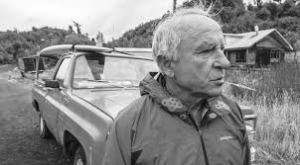 Dude, Yvon Chouinard was born in Lewiston and has more blue-collar cred than you’ll ever get.
Dude, Yvon Chouinard was born in Lewiston and has more blue-collar cred than you’ll ever get.
I’ve railed about this before, the native card, the dismissal of anything and anyone not resident in the state for at least 5 generations, but what galled me even more is my sense that, despite her native status, Maine voted for Collins more in favor of pork over progress. Her origins in the County were a convenient excuse.
Collins’s main selling point for her candidacy was her seniority, which allows her to rake in benefits for specific Maine interests: the lobster industry, Bath Iron Works.  Her reelection apparently absolves her of responsibility for anyone who cannot partake in that particular pork pie. But worse, to preserve the state’s access, Collins twists herself into widening gyres of noncommitment and “deep concern” on issues far more fundamental to humans and the country as a whole than a bigger paycheck every year: healthcare, human rights, immigration, the rule of law. She traded her duty to represent all of Maine for a bigger shovel at the
Her reelection apparently absolves her of responsibility for anyone who cannot partake in that particular pork pie. But worse, to preserve the state’s access, Collins twists herself into widening gyres of noncommitment and “deep concern” on issues far more fundamental to humans and the country as a whole than a bigger paycheck every year: healthcare, human rights, immigration, the rule of law. She traded her duty to represent all of Maine for a bigger shovel at the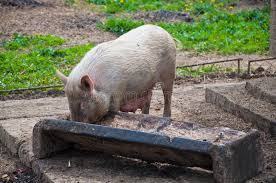 trough. Which is excellent if you’re one of the lucky recipients, and not so good if you expect her to represent a large part of this state’s need for living wages, healthcare that doesn’t leave you broke, and a respect for all places of origin, whether Maine, Massachusetts, or Mali.
trough. Which is excellent if you’re one of the lucky recipients, and not so good if you expect her to represent a large part of this state’s need for living wages, healthcare that doesn’t leave you broke, and a respect for all places of origin, whether Maine, Massachusetts, or Mali.
I’m enough of an optimist to feel the change that’s coming, and I know it will be slow. But I look forward to a time when my, yes, adopted state understands that forward motion doesn’t negate history, that we can all progress without succumbing to a xenophobia that makes many of us look both greedy and afraid.
January 22, 2021
Weekend Update: January 23-24, 2021
 Next week at Maine Crime Writers there will be posts by Maureen Milliken (Monday), Dick Cass (Tuesday), Darcy Scott (Thursday) and Sandra Neily (Friday).
Next week at Maine Crime Writers there will be posts by Maureen Milliken (Monday), Dick Cass (Tuesday), Darcy Scott (Thursday) and Sandra Neily (Friday).
In the news department, here’s what’s happening with some of us who blog regularly at Maine Crime Writers:
A reminder to our writer friends that submissions for the Maine Literary Awards close on Feb. 1st. Get the details here: https://www.mainewriters.org/mla-submission-guidelines
Kate Flora is looking for a few volunteers to be beta readers for a new mystery, Not What You Think. To volunteer, contact her at: writingaboutcrime@gmail.com
Dick Cass: As fans of my Elder Darrow mystery series know, I designate a charity each year to receive a contribution per sale. This year’s charity is https://themayflyproject.com, which uses fly fishing to mentor and support foster kids. I look forward to helping them thrive.
An invitation to readers of this blog: Do you have news relating to Maine, Crime, or Writing? We’d love to hear from you. Just comment below to share.
And a reminder: If your library, school, or organization is looking for a speaker, we are often available to talk about the writing process, research, where we get our ideas, and other mysteries of the business. We also do programs on Zoom. Contact Kate Flora
January 21, 2021
The Writers’ Ah-hah and Uh-Oh
Like so many these days, I’m not sleeping like I used to. For the most part, it’s not pandemic worries that keep me awake at three in the morning. Instead, it’s what I’ll call “the new book syndrome”.
I’m working on number five in my Maine Oceanographer Mara Tusconi series. “The Shark, The Girl, And The Sea” (working title) will be published in May or June, and at this point I’m pretty much on schedule. So no pressing deadline is interrupting my dreams.
Instead, I am experiencing two distinct “writers’ ah-hah” moments. In the wee hours of the morning as my husband softly snores beside me, I am awake trying to untangle a snag in my story or, one some occasions, a downright monkey wrench. After quickly taking care of the first, I’ll be asleep not long after. The second, however, might keep me awake for hours.
Writers often face small, often momentary, snags in a story that need fixing. I’m talking about things like “the thirty year old dirty blonde in chapter one is inexplicably fifty and brunette in chapter eleven”. Such mistakes are usually readily remedied; the harder part is identifying them because they are so easy to miss.

Money wrench mistakes are a lot messier to repair. Imagine you are writing a fictional account of Britain during World War II and build your story around islands that you should have known were totally destroyed early on in the blitzkrieg. While you could back peddle, it would take time and might end up being a very different kind of narrative. You get the idea; there is no easy remedy to this one. The fix just takes time.
There are many reasons, of course, why writing is so darned hard. Perfectionists keep returning again and again to their work. Avoiders find every excuse to postpone what they must do. Someone fearful of failing may be afraid to even try.
All this means, writing colleagues, that every once in a while we need to hold up our published books or manuscripts in progress and simply be proud.
January 20, 2021
My Joe Biden Story
Many people who lived in the Delaware Valley (southeastern Pennsylvania, southwestern New Jersey, and the state of Delaware) in the 1980s and 1990s have a Joe Biden story. Here’s mine.
In the early 1980s I was the dean of a small college in Philadelphia. A professor invited me to attend his class on the American political system to meet and hear a guest speaker he thought I would like. For 50 minutes Senator Joe Biden enchanted the students, mixing commentary on the Constitution with anecdotes about current politicians and lessons learned in campaigns. It was an impressive performance that clearly captured student interest. I was so impressed that afterwards I recommended to the college’s president that we invite Biden to receive an honorary degree and give the commencement address that spring. Entirely to my surprise, the president, a staunch republican, agreed. I later learned that he had discussed the matter with a trustee who happened to be a senior officer at Dupont and who therefore knew Biden well. “Joe’s okay,” I found out the trustee told my president.
One of my jobs as dean was to be the master of ceremonies for commencement. The stage party was assembled in a building adjacent to the large tent where the ceremony would take place. As the time approached to lead the party forward, we were without our speaker. Where was Joe Biden? I managed to reach one of his aides by phone in his Delaware office (this was long before the wide use of mobile phones) and learned that the senator had left Wilmington and was on his way. The crowd under the tent was growing restless. In the middle of May, Philadelphia is tropical, sitting under a tent doesn’t make the heat and humidity more bearable, and so the audience was not enjoying the delay. I went on stage to explain that our commencement speaker was slightly detained and would arrive soon. Groans.
We waited. No Biden. I called the aide again and got a description of the car Biden was being driven in, and the head of our security office phoned a contact at the Philadelphia Police Department. In several minutes we got a report that the PPD had picked up Biden’s car on the Schuylkill Expressway and was escorting him. It must have been a slow day for the cops because they made a bit of a game out of it, leading and trailing his car with motorcycles and patrol cars, lights flashing and sirens roaring—though no one could have known it then, a preview of the way Biden travels today.
I went back to the stage to announce that we would begin shortly and that the sounds of emergency vehicles they heard meant that Senator Biden was almost there. Loud cheers. When we met up the senator apologized and thanked me for the escort. “Anytime, I told him.” He laughed, suited up in academic garb, and lined up for the march. More cheers greeted our arrival on the stage. When his turn came, Biden apologized for the delay, gave a short but enthusiastic speech, thanked the college for helping him get there “almost on time,” and received a standing ovation. I have no memory at all of what he said. Who remembers such things? What I do remember is the way in which Biden so quickly turned the crowd his way. They might have booed him for making them broil in the Philadelphia cauldron, but they responded to his humility and the strong image he projected as being down-to-earth and decent. He stayed after the speech to chat with parents and students and pose for pictures. Smart politician, of course, but at his core a nice guy who instinctively empathized with the crowd, sharing and amplifying the joy a commencement triggers for graduates and their families.
This remembrance of Joe Biden came to me vividly in the days leading up to yesterday’s Inauguration. Whatever your political leanings, you had to feel tension and fear as chaos seemed to reign. In such times we writers and readers of stories create or recall narratives that give shape and direction to our emotions. Collectively, we add our individual stories to the national story. Remembering my early experiences with our new President reinforced my patriotism, my hopes, my conviction that our nation will heal. He showed up on time.
 Photo by Danne on Pexels.comLong may it wave
Photo by Danne on Pexels.comLong may it wave
January 18, 2021
Poems for You, While I Catch Up
Kate Flora: I am dug deep into a first review of the manuscript of my next book, Not What You Think, with the final edits on the next Joe Burgess procedural, A World of Deceit, waiting for me. With a head so full of word choices and character names and is there enough momentum, I couldn’t pull together a topic for a blog posts today, so I am sharing some winter poems instead.

Snow Day
Today we woke up to a revolution of snow,
its white flag waving over everything,
the landscape vanished,
not a single mouse to punctuate the blankness,
and beyond these windows
the government buildings smothered,
schools and libraries buried, the post office lost
under the noiseless drift,
the paths of trains softly blocked,
the world fallen under this falling.
In a while, I will put on some boots
and step out like someone walking in water,
and the dog will porpoise through the drifts,
and I will shake a laden branch
sending a cold shower down on us both.
But for now I am a willing prisoner in this house,
a sympathizer with the anarchic cause of snow.
I will make a pot of tea
and listen to the plastic radio on the counter,
as glad as anyone to hear the news
that the Kiddie Corner School is closed,
the Ding-Dong School, closed.
the All Aboard Children’s School, closed,
the Hi-Ho Nursery School, closed,
along with—some will be delighted to hear—
the Toadstool School, the Little School,
Little Sparrows Nursery School,
Little Stars Pre-School, Peas-and-Carrots Day School
the Tom Thumb Child Center, all closed,
and—clap your hands—the Peanuts Play School.
So this is where the children hide all day,
These are the nests where they letter and draw,
where they put on their bright miniature jackets,
all darting and climbing and sliding,
all but the few girls whispering by the fence.
And now I am listening hard
in the grandiose silence of the snow,
trying to hear what those three girls are plotting,
what riot is afoot,
which small queen is about to be brought down.
White-Eyes
BY MARY OLIVER
In winter
all the singing is in
the tops of the trees
where the wind-bird
with its white eyes
shoves and pushes
among the branches.
Like any of us
he wants to go to sleep,
but he’s restless—
he has an idea,
and slowly it unfolds
from under his beating wings
as long as he stays awake.
But his big, round music, after all,
is too breathy to last.
So, it’s over.
In the pine-crown
he makes his nest,
he’s done all he can.
I don’t know the name of this bird,
I only imagine his glittering beak
tucked in a white wing
while the clouds—
which he has summoned
from the north—
which he has taught
to be mild, and silent—
thicken, and begin to fall
into the world below
like stars, or the feathers
of some unimaginable bird
that loves us,
that is asleep now, and silent—
that has turned itself
into snow.
Winter Trees
All the complicated details
of the attiring and
the disattiring are completed!
A liquid moon
moves gently among
the long branches.
Thus having prepared their buds
against a sure winter
the wise trees
stand sleeping in the cold.
Dust of Snow
BY ROBERT FROST
The way a crow
Shook down on me
The dust of snow
From a hemlock tree
Has given my heart
A change of mood
And saved some part
Of a day I had rued.
Lea Wait's Blog
- Lea Wait's profile
- 506 followers



